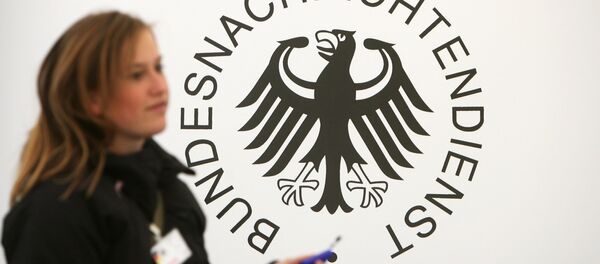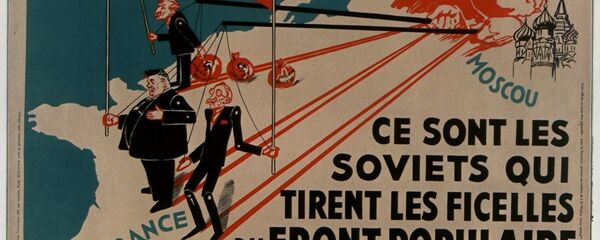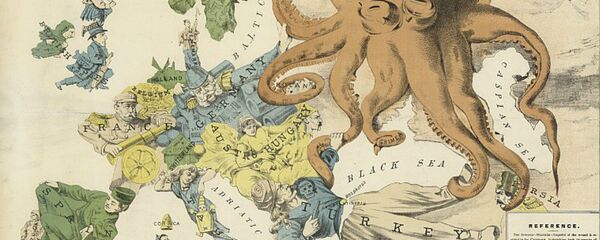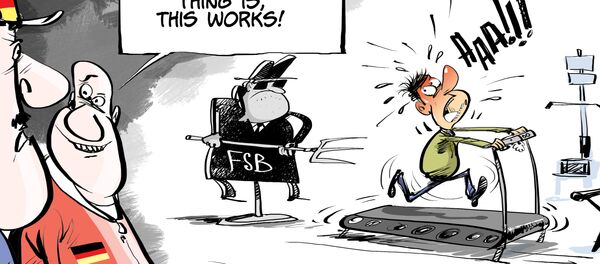On Thursday, German daily newspaper Sueddeutsche Zeitung reported that the German government had tasked the country's intelligence services with conducting an investigation into whether Russian media were engaging in propaganda warfare aimed at 'destabilizing' Germany and weakening its government.
The Chancellery therefore tasked the Federal Intelligence Service and the Federal Office for the Protection of the Constitution (Germany's counterintelligence service) with investigating "whether or not this is all part of a certain framework," and whether the Kremlin has revived "its old methods of Cold War propaganda," officials explained.
Commenting on Berlin's allegations and the launching of the investigation, experts speaking to independent Russian newspaper Svobodnaya Pressa suggest that it could indicate that Germany and the West are looking to ramp up the information war being waged against Russia and its foreign broadcasters.
"Factually, this hysteria (and there is no other way to describe it), seems to suggest that the information war being waged against Russia is entering a new level," Alexander Kamkin, senior researcher at the Center for German Studies at the Russian Academy of Sciences, told the newspaper.
"We already saw a vivid example of this [last month], when a legal case was filed in Berlin against the work of a Russian journalist" who was covering the alleged rape of the Russian-speaking German girl.
"That instance, you might say, was the 'first shot'," Kamkin said. "Now, on the basis of the precedent, a system is being formed. An image of the 'enemy' is being created in the minds of Germans. That is, if earlier, during the Cold War, our country served as a nuclear-armed 'rogue superpower', today's Russia is shown as an 'evil empire'…attempting to control public opinion in Europe with the help of Russian media – RT, Sputnik, and so on."
Ultimately, Kamkin warns, the intelligence services' investigation may be an indication that local media outlets' attempts to counteract Russian foreign language media may not be enough, and that the state's repressive apparatus will now effectively be used to silence free speech.
It's difficult to say how ordinary Germans will react, the analyst said. "Unfortunately, the number of Russian English- and German-language resources available in Germany is limited. However, as many of my German colleagues say, they read Sputnik and watch RT, which helps them to filter the information they receive elsewhere."
On many issues, Kamkin noted, Russia and Russian politics excluded, "for example, regarding the war in Syria, or the Western coalition's lack of success against the Islamists, the readers of German news portals are interested in receiving alternative sources of information, because their confidence in their own media, especially in the context of the migrant crisis, has dropped significantly."
"In other words, according to the logic provided by the investigation, the media must express a point of view which is interesting, relevant and positive for political figures in Germany. A similar phenomenon, it's worth noting, exists in other countries, including in the self-proclaimed hegemon of world politics, the United States. This event only serves once again to confirm the lack of freedom in the media."
Moreover, Russia, and Russian media, Ponomareva noted, "have the right to express their position on this or that political, economic or social issue," and the fact that the German government is so "worried and bothered by the position of some Russian media indicates that they have something to hide. Because if there weren't any serious political overtones, it is unlikely that the intelligence services would be mixed up."
"And if some [Russian] newspaper or internet resource is discussing an issue – for example, the sexual assaults against women which took place on New Year's Eve in Cologne, or the migration crisis, or the adoption of Russian children, it is not interference in another country's internal affairs. Rather, it is a sign of concern in the situation that exists, particularly in Germany, but also in Europe as a whole."
"If we were to follow the logic of German politicians and media," Ponomareva suggested, "Russian media should have no right to discuss any issue in world politics whatsoever."
"Alternative viewpoints on problems can help to solve these problems. However, once some questions are snipped or censored, a snowball effect emerges – accumulating and accumulating until it crashes down at the most inopportune moment."
"Therefore," Ponomareva says, "it is very surprising to see such a position from our Western colleagues, who constantly use all the platforms at their disposal to criticize Russia for its alleged lack of media freedom. In reality, it turns out, contemporary Russia is one of the few countries where, in general, there is real freedom of expression. Perhaps our Western colleagues stand to learn a thing or two from us."
"In this sense," Ponomareva suggested, "the current initiative by the German government is evidence of our successful work in the informational space – in conditions of information war, factually speaking."
"With regard to the political decisions which may be taken on the basis of the investigation, it is possible that our resources might be forbidden from being broadcast, and that Russian sites will be blocked in various countries. In this sense, it might be said, Ukraine and the Baltic states have served only as the 'pilot projects' [for such a scenario]."







